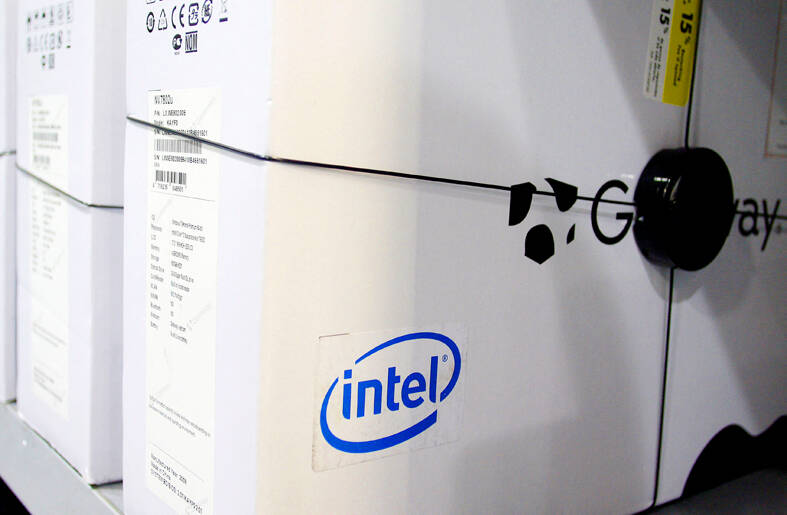Semiconductor giant Intel Corp and PC brand Asustek Computer Inc (華碩) have agreed to team up to manufacture, sell and support new generations of the Next Unit of Computing (NUC) line of mini-PCs.
NUCs are a line of small computers designed by Intel that are small enough to be held in one hand, but still pack the power and utility of a complete computer system. They function like a PC, and are used with a mouse, keyboard and monitor or other types of screens.
In a statement released overnight, Intel said the two companies have agreed to a term sheet to take the Intel NUC product line forward.

Photo: Reuters
Intel said Asustek’s expertise and track record delivering industry-leading mini-PCs to customers makes it ideally suited to continue driving innovation and growth in NUC products.
The partnership came after Intel announced earlier this month that it plans to stop “direct investment” in its NUC line, but said the company aimed to change its strategy to enable its ecosystem partners to continue innovating the mini-PCs.
Under the agreement, Asustek is to receive a non-exclusive license to Intel’s NUC designs, enabling it to produce and sell 10th to 13th-generation NUC systems, as well as develop future designs.
In addition, Asustek is to launch a new business unit called Asus NUC BU to provide product and support continuity for Intel NUC customers.
“As we pivot our strategy to enable ecosystem partners to continue NUC systems product innovation and growth, our priority is to ensure a smooth transition for our customers and partners,” Intel vice president and Intel Client Platform Solutions general manager Sam Gao (高嵩) said in the statement.
“I am looking forward to Asus continuing to deliver exceptional products and supporting our NUC systems customers,” he said.
Also in the statement, Asustek chief operating officer Joe Hsieh (謝明傑) said the partnership would have benefits for his company’s PC development.
“I am confident that this collaboration will enhance and accelerate our vision for the mini-PC — greatly expanding our footprint in areas such as AI [artificial intelligence] and AIoT [AI of Things],” Hsieh said.

The New Taiwan dollar is on the verge of overtaking the yuan as Asia’s best carry-trade target given its lower risk of interest-rate and currency volatility. A strategy of borrowing the New Taiwan dollar to invest in higher-yielding alternatives has generated the second-highest return over the past month among Asian currencies behind the yuan, based on the Sharpe ratio that measures risk-adjusted relative returns. The New Taiwan dollar may soon replace its Chinese peer as the region’s favored carry trade tool, analysts say, citing Beijing’s efforts to support the yuan that can create wild swings in borrowing costs. In contrast,

Nvidia Corp’s demand for advanced packaging from Taiwan Semiconductor Manufacturing Co (TSMC, 台積電) remains strong though the kind of technology it needs is changing, Nvidia CEO Jensen Huang (黃仁勳) said yesterday, after he was asked whether the company was cutting orders. Nvidia’s most advanced artificial intelligence (AI) chip, Blackwell, consists of multiple chips glued together using a complex chip-on-wafer-on-substrate (CoWoS) advanced packaging technology offered by TSMC, Nvidia’s main contract chipmaker. “As we move into Blackwell, we will use largely CoWoS-L. Of course, we’re still manufacturing Hopper, and Hopper will use CowoS-S. We will also transition the CoWoS-S capacity to CoWos-L,” Huang said

Nvidia Corp CEO Jensen Huang (黃仁勳) is expected to miss the inauguration of US president-elect Donald Trump on Monday, bucking a trend among high-profile US technology leaders. Huang is visiting East Asia this week, as he typically does around the time of the Lunar New Year, a person familiar with the situation said. He has never previously attended a US presidential inauguration, said the person, who asked not to be identified, because the plans have not been announced. That makes Nvidia an exception among the most valuable technology companies, most of which are sending cofounders or CEOs to the event. That includes

INDUSTRY LEADER: TSMC aims to continue outperforming the industry’s growth and makes 2025 another strong growth year, chairman and CEO C.C. Wei says Taiwan Semiconductor Manufacturing Co (TSMC, 台積電), a major chip supplier to Nvidia Corp and Apple Inc, yesterday said it aims to grow revenue by about 25 percent this year, driven by robust demand for artificial intelligence (AI) chips. That means TSMC would continue to outpace the foundry industry’s 10 percent annual growth this year based on the chipmaker’s estimate. The chipmaker expects revenue from AI-related chips to double this year, extending a three-fold increase last year. The growth would quicken over the next five years at a compound annual growth rate of 45 percent, fueled by strong demand for the high-performance computing